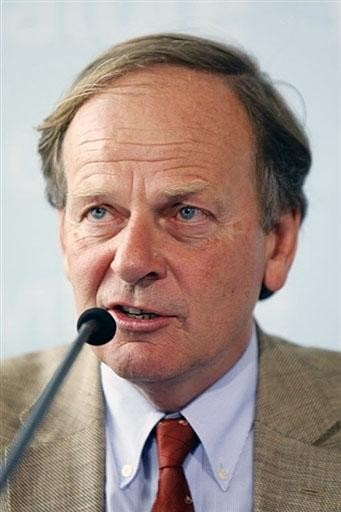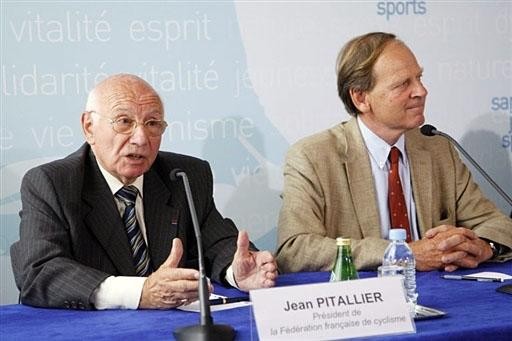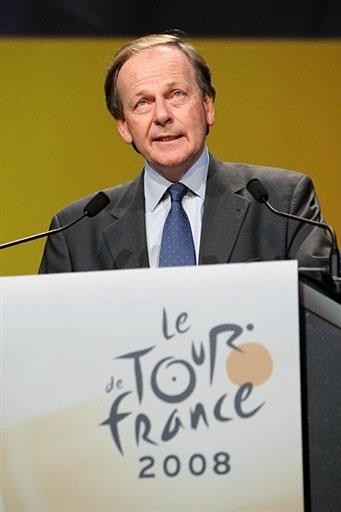ASO refutes UCI president's claims
Amaury Sport Organisation president Patrice Clerc responds to Cyclingnews' interview with UCI...



News Feature, April 2, 2008
The battle of words continues, further adding to cycling's inconsistencies
While the 2008 season is fully underway, the two most powerful protagonists of the sport, the International Cycling Union (UCI) and the Tour de France organiser ASO, have ceased talking to one another. Relations are non-existent, and the owner of the most important events of the sport is organising its races with the help of the French federation FFC.
The UCI has lashed out at all parties involved, going so far as to take disciplinary action against the FFC as well as the teams and riders, and to theorise that the ASO is trying to supplant the UCI. Cyclingnews contacted ASO president Patrice Clerc to get a response to the recent statements made to Cyclingnews by his UCI counterpart, Pat McQuaid.
With cycling's credibility so widely agreed upon as the sport's number one problem, it is ironic that the sport's governing body and the organiser of the sport's most prestigious races would engage in what appearst to be a perfect example of Sophistry rather than meeting face to face to come to an accord, but both sides prefer at the moment to play out the battle in the press.
In ancient Greece, Sophists were intellectuals who employed rhetoric to persuade or convince others. They were also the first lawyers in the world, due their extremely developed argumentation skills. In the modern day version on display in the sport of cycling, it is becoming increasingly difficult to get to the truth behind the words from both sides, and even close followers of the story are left wondering if there are any facts behind the fluster or any hope of resolution.
No parallel federation to UCI
The latest race content, interviews, features, reviews and expert buying guides, direct to your inbox!
In one example of the baffling contradictions which emanate from this conflict, the UCI has maintained that the ASO is creating a second governing body of cycling, because it managed to hold a major event, Paris-Nice, without any help from the UCI. The FFC agreed to ensure its rules and regulations were respected and the French Anti-Doping Agency AFLD carried out anti-doping controls. Clerc refuted McQuaid's allegations that his organisation seeks to replace the UCI, and maintained that ASO wanted its races to take place under the regulatory framework of a strong sports authority.
"Since Paris-Nice, I hear from all sides that ASO wants to create its own federation, parallel to and rivaling the UCI," Clerc told Cyclingnews on Tuesday. "Now, that is ludicrous! I have never, ever said or thought about this... The ASO does not want to create a new federation, quite the contrary!
"McQuaid even goes further, saying that ASO is supported in this project by the French federation, the sports minister and the French government, and even the president of the République, Mr Sarkozy! Now, if the fate of cycling wasn't at stake, this could really make you laugh! It is senseless and completely wrong.
"From the very beginning, we never stopped saying that we believed in a strong sports authority, and that we want our races to take place under a regulatory framework, under the aegis of the French federation, and of course under the aegis of the federation of federations, the UCI. But not under the UCI as it is now, but under a governing body as it should be, which remains in its field of competence and does not change its role."
About roles and objectives
One of Clerc's main assertions is that the ProTour is the UCI's way to privatise the sport, making a closed league in the American model of professional sports like basketball or football. In his view, the UCI ProTour was designed to create revenue, and this goes against his view of the role of a governing body. "The UCI's role is to regulate the sport," he argued. "But now it acts like an economic entity, and that is not its role! That would be like us saying that we wanted to make the rules. The UCI accuses us of doing what it does. It is quite extraordinary."
The head of the ASO was also baffled at the choice of words McQuaid employed in his recent statements, where the Irishman insisted that he would not meet with his opponents "while they hold a gun to our head". "What struck me was that Mr. McQuaid talked about us holding a gun to his head - but we are not in Lebanon!" Clerc responded. "Of course, it is a conflictual situation, but now, the UCI says it is at war against a race organiser. The UCI, whose mission it is to develop the sport, regulate it and promote it is now at war against the organiser of the biggest event of the sport... That is surprising, to say the least, and makes no sense to me.
"We want to work at the reform of professional cycling, and we want this reform to be accepted and adopted by the main protagonists of this sport. All we have done these past four years is call upon a meeting of the sports' actors - the teams, the riders, the sponsors, the federations and the organisers - to agree on the best system to make this sport a healthy one. And that is the mission of the UCI! It is to develop the sport, not to be at war!"
The teams under pressure?
One of the reasons the situation between the two parties escalated was that ASO chose to hold this year's Paris-Nice outside of the aegis of the UCI, which meant any professional teams taking part were violating the rules of the governing body. The teams were caught in the line of fire, and finally opted to participate in the race despite fearing sanctions from the UCI.
"Mr. McQuaid said we put pressure on the teams to participate in Paris-Nice. That is almost defamation!," exclaimed Clerc. "It was the UCI which put pressure on the teams. Again, the UCI accuses us of doing what it did. We have always said that we did not believe compulsory participation in a race was a good thing. Participation should be freely decided, because teams and sponsors have to want to come to a race."
Cyclingnews reiterated the question, and asked again if ASO told the teams 'if you don't come to Paris-Nice, you won't be invited to the Tour', as McQuaid alleged in his latest interview. "Never. Ask the teams. We never said such a thing. Now, maybe the teams said to themselves, 'We'd better be on good terms with ASO if we want to go to the Tour' - certainly they thought like that. But we did not pressure them. The UCI did - they were the ones to threaten the teams and to call for a boycott. They threatened the teams with suspensions, financial sanctions, retaining their bank guarantees... But we never threatened them."
Ultimately, Paris-Nice went ahead and much to plan as an exciting bike race in 2008. With the FFC ensuring the regulatory framework, and the French Anti-Doping Agency AFLD in charge of the anti-doping control, there was little to no difference felt to previous editions under the aegis of the UCI. "I don't see a difference between Paris-Nice this year, and the Paris-Nice of last year," Clerc argued. "Does this mean the UCI is not necessary to organise a bike race? I leave that question unanswered."
The fight against doping: the sports' #1 priority
The former president and director of the French Open tennis tournament insisted that the fight against performance-enhancing drugs or methods should be the sports' main priority, without which, as he said, "the sport is dead." But he felt that this was not the UCI's first concern. "My biggest divergence with the former president of the UCI is that we don't have the same vision of sports," explained Clerc about Hein Verbruggen, who is still vice-president of the UCI today. "That is the reason for the rift between us since 2004. The first priority in cycling, to me, is to repair and restore the credibility and the image of this sport. We need to have a sacred union, a pact to do this, whatever our difference of opinion might be."
Clerc continued, "Now, the fight against doping is used by the UCI like a weapon in its war against us. I read somewhere that the biological passport might not be given to the disposal of unfriendly organisers," he claimed. "That means that the fight against doping is not the governing body's first and foremost priority."
In his recent interview, Pat McQuaid also alleged that ASO did not support the biological passport on a financial level. "What does he know? The UCI declared that they don't talk to us anymore. With regard to the financing of the passport, my only tie is to the French ministry of sport, which was the foundation of this anti-doping tool as they were the ones who organised the meeting between the different parties. We agreed to finance the project with them. They have not asked us yet to contribute, but we agreed we would."
Clerc still believed in the biological passport as a means to fight doping, and hoped the tool will be available before the Tour de France. "I hope that we will be able to use it through the French federation. Instead of battering the French government and the sports minister, Mr Laporte, Mr. McQuaid should really be thankful to him for having initiated the project. The sports ministry is a neutral institution, which has only one concern: the fight against doping, which - and that is true - was also addressed by the government and president Sarkozy, as it is a threat to the Tour de France."
ASO's contributions to the sport
In his comments to Cyclingnews, McQuaid complained that ASO did not contribute to the development of the sport's basis. Clerc, of course, disagreed. "But isn't organising the Tour de France, as it is, the best catalyst of the world-wide development of cycling? You'd also have to explain to me how the events recently created by the UCI contribute to the popularity of cycling in the world. I think the best way to make this sport grow is to carry out big races, covered to the maximum by the international media. That's what makes children dream, that's how cycling clubs are filled and that's what makes future riders, spectators and TV audience.
"The promotion of cycling in the world is constituted by the organisers of the biggest races, the riders - who are the #1 heroes - as well as the media: because you can be a hero in your hometown village, but the rest of the world will not know it," he continued.
But ASO, whilst being a company with commercial interests, also supported the sport otherwise, Clerc insisted. "ASO has been contributing to the development of the sport by organising races that are not profitable, because we think it is our duty to offer races to the teams throughout the year," he added.
"If we only had an economical vision of cycling, as Mr. McQuaid alleges, don't you think we'd have scrapped the Tour de l'Avenir a long time ago? The same applies to the Tour de Picardie and the Critérium International, to a certain extent. And what about the Tour du Faso in Africa? We organise those races.
"And there is a third point: We also work closely with the French federation on a number of training programmes for Espoir riders in France, and we are currently looking at new projects to make more people take licenses with local clubs. So, to say that we do not contribute at all to the development of the sport, is untrue. We have been flooded by untruths for four years now."
A future for the ProTour?
Asked if he thought that the UCI could continue the ProTour throughout the years to come, without having to revise it entirely, Clerc replied, "The ProTour was inspired by the concept of Formula 1. I do not adhere to this kind of concept, as it cuts off the highest level of cycling from its basis. There is no bridging up to it. You take the highest level teams, put them on a plate and move them around the world to the highest bidders.
" I don't think this is a good system for cycling. Maybe it is for certain people. If the UCI wants to create a private enterprise and develop the system of the ProTour, like a private organiser, then it will be our competitor - and that would be very good! Competition is a great thing, it makes for progress. But the UCI can't be race organiser and make up the rules at the same time. That is not possible, and there lies the whole problem since the beginning of the ProTour."
Moreover, Clerc insisted that not only the Grand Tour organisers did not accept the ProTour. Many more important actors disagreed with the current system, he said, and want it revised. "I would like you to insist on one thing: we always talk of 'the UCI' - but the ongoing problems between us and the UCI do not concern the entire institution, only its presidency," he added.
"This is only about a small number of persons at the top of the UCI, who are in a clash with the four federations which represent the eight monuments of cycling: the three Grand Tours and the five classics. These four federations (the Belgian, Italian, Spanish and French) are in open, violent opposition with the UCI. It's not only us who disagree with them. It's not a coincidence that these, as well as other European federations are standing behind our ideas.
"All we want is to sit down with all the actors of the sport and find a reform to pro cycling that convenes everybody: the riders, the teams, whether they are in first or second category, the organisers, whether they organise big or small events. This has been going on for too long."
In the meantime, it's 'business as usual' for ASO. With regard to carrying out its races this season, the organiser is determined to "do our job. We as race organisers have been doing this for over a hundred years, and we have largely contributed to improving race conditions, promotion, coverage etc. We will continue to do it, what can I say. This year, within the framework of the French cycling federation."